Kyle Jolliffe
A Look Back at Some Lost
Open-Air Restaurants
of New York City
Summer is here, an opportune time to look back at some long-ago open-air restaurants in New York City. Garden restaurants existed in New York since the 1760s, but by the early 20th century, between the 1900s and the 1920s, they had grown to enormous sizes to slake the thirst and fill the appetites of the city’s inhabitants.
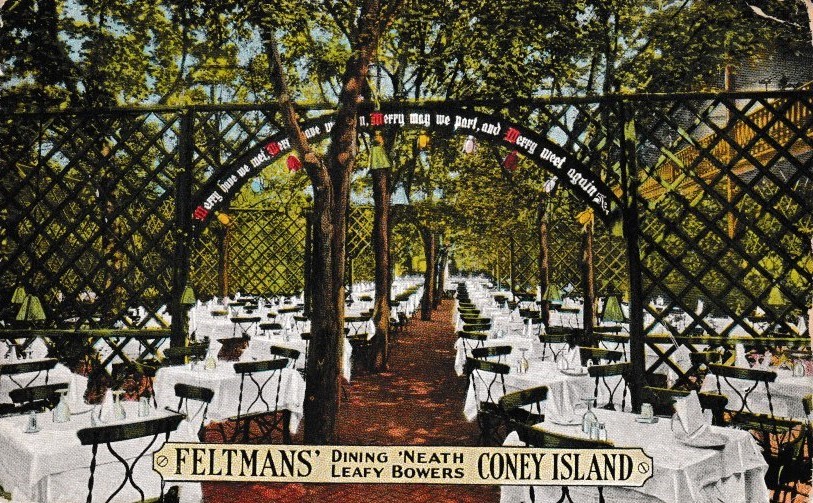
Perhaps the best known of these places is Feltmans’ on Coney Island in Brooklyn. Starting in 1871, Charles Feltman leased land and began building a restaurant complex. At its peak in the 1920s it served over five-million people a year. It had several restaurants, two bars, a beer garden, a famous carousel, and other attractions, and served up many types of food besides the hot dogs for which it is famous. This postcard was printed in 1925 by the Curt Teich Company.
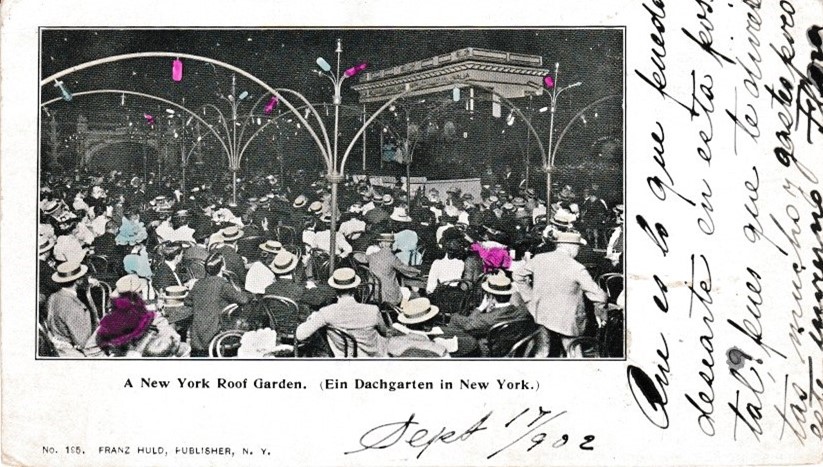
Coney Island had the available land for spacious places like Feltmans’, but by 1900 taller buildings in Manhattan and the hot summers in New York City produced a new and popular dining experience, the open-air roof garden restaurant. They were located in hotels and theaters, where diners could enjoy refreshing breezes along with cool drinks, food, dancing, and musical or theatrical entertainment.
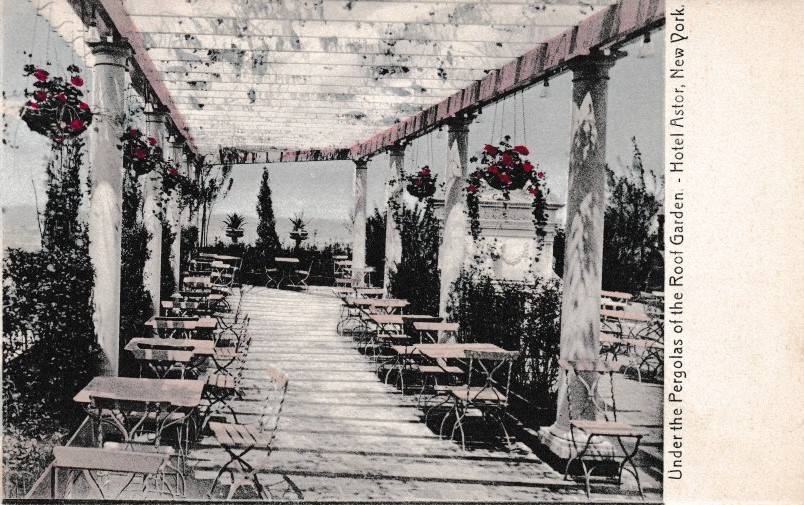
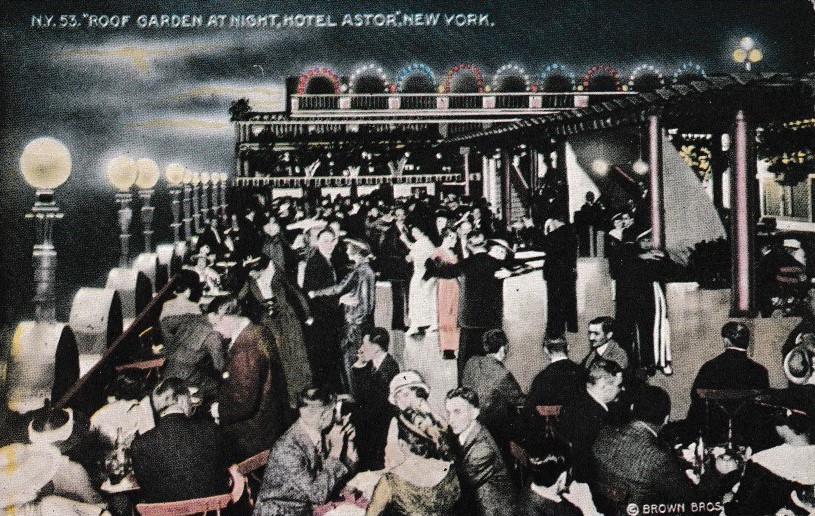
At the Hotel Astor the 1908 renovation produced a formal garden with grottos and palm trees. There, a series of promenades, fountains, and incandescent archways took up thousands of square feet. At night its illuminated archways had an enchanting effect. Visitors could stroll around for hours, enjoying the view of the Times Square area and beyond while three orchestras distributed around the roof played on. Long lines of pergolas, complemented by growing vines and hanging baskets, helped make visitors forget that they were in a vast hotel which was part of a vaster metropolis. The Hotel Astor survived until 1967.
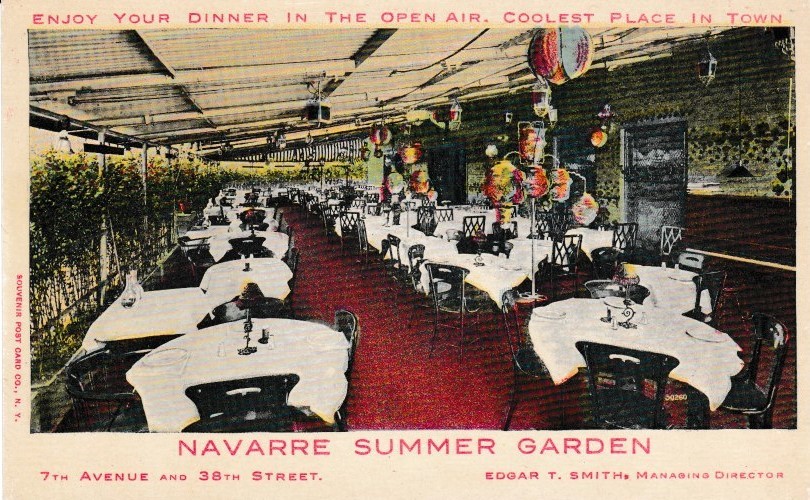
The elegant French Renaissance style Hotel Navarre at 7th Avenue and 38th Street had the gaily decorated shaded Navarre Summer Garden, in addition to its Dutch Grill and Main Dining Room. ‘’Enjoy your dinner in the open air. Coolest place in Town,’’ certainly seems to be truthful advertising on this card. The hotel closed permanently in 1930.
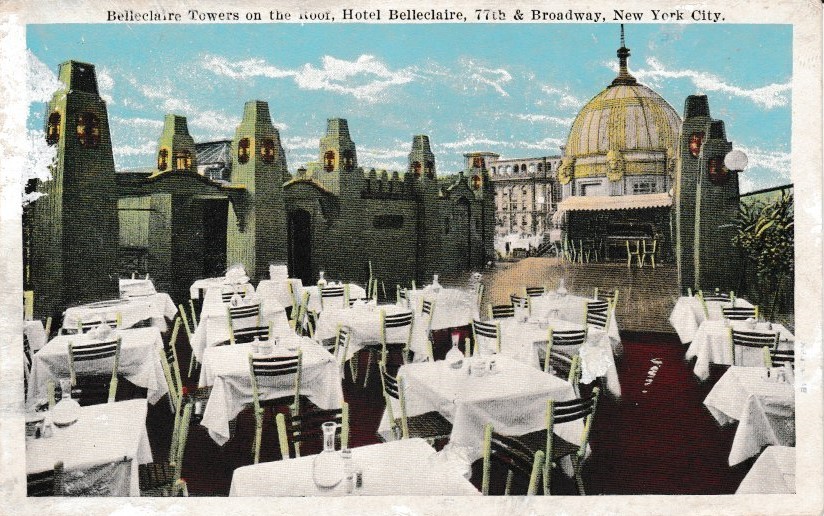
The Belleclaire Towers rooftop restaurant in the Hotel Belleclaire at Broadway and 77th Street must have been a good place for an elegant summer meal. Also, from this postcard, it looks like it may have had a stage for entertainment. This hotel is still in business, although temporarily closed.
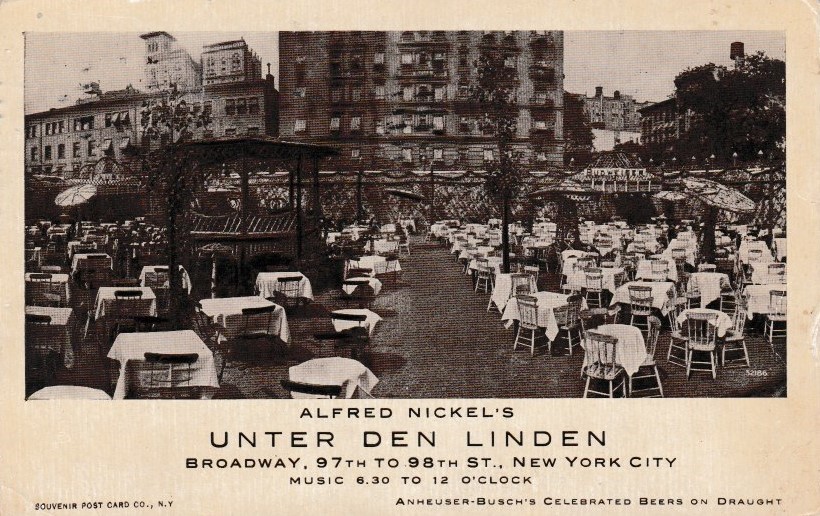
Farther uptown, at Broadway and 97th Street, at Alfred Nickel’s Unter Den Linden (the name of a central thoroughfare in Berlin, Germany) restaurant the rooftop garden had the unmistakable character of a German beer garden. It had a capacity of 3,400 people and music in the evenings. This card was sent in 1911 by a son working at the restaurant to his father in the Catskills, telling him that he worked hard there. This restaurant closed permanently long ago, but the two-storey, 1901 building still survives as a holdout at the corner of Broadway and West 97th Street.

The upscale Carlton Terrace Restaurant at Broadway and 100th Street opened in 1911 in a one-storey building later expanded to two-stories. The roof garden there opened in April 1913 and had a seating capacity of 400. This restaurant, like many hotels and restaurants in New York City, closed in 1921 probably due to Prohibition, enacted the previous year.
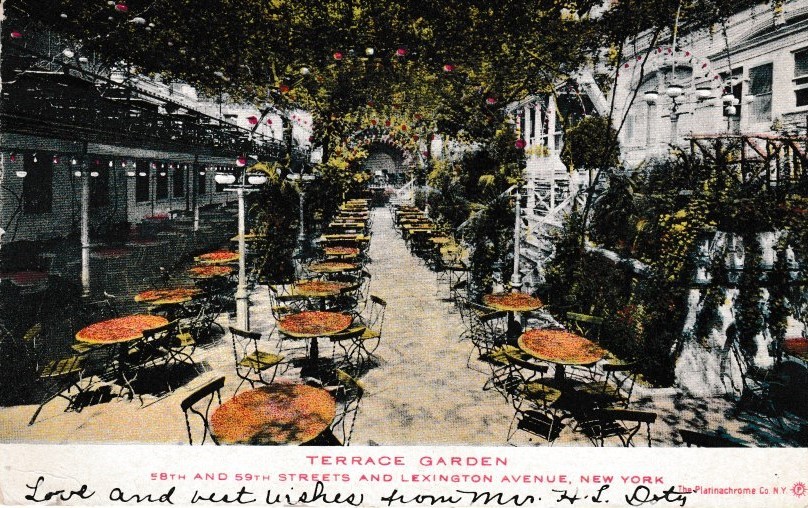
Our look back at these open-air garden restaurant venues concludes with the Terrace Garden at 58th Street and Lexington Avenue. The Terrace Garden (also known as the Lexington Opera House) opened in 1866 as a complex that included a concert hall, ballroom, banquet and meeting rooms, with an attached hotel and outdoor garden. In the outdoor garden refreshments were combined with entertainment. An orchestra area can be seen in the background of this Terrace Garden postcard. The Terrace Garden closed in the late 1920s.
Detailed histories of places like these and other buildings, statues, and points of interest that make Manhattan fascinating may be found on the Daytonian in Manhattan website.
Feltmans’ was where my father’s parents spent their Sunday afternoons. The beer garden was a family place where children were welcome and could ride the carousel. He always spoke fondly of his time there. When the carousel was moved to Flushing Meadow Park, Queens, in the 1960s we visited it. He was amazed that the horses were in reality smaller than in his child’s imagination.
Thank you for telling me about all those other dining places.
Interesting article, Kyle. Hope you’ll contribute to this magazine again soon.
Interesting that these open gardens return to us as the outcome of the Covid-19 pandemic. Thanks Kyle.
Very interesting! Rooftop dining is truly a special way to eat al fresco.
Oh what fun. Roof gardens, dancing, entertainment, lights, sounds from the streets below, What a wonderful, amazing time this was and just perfect for postcard souvenirs of the evening and notes to share with friends who might have shared their good luck to be there in the evenings. Thanks for sharing and showing this variety. ONWARD with your collecting and discovering and such richness from the postcard world. Good for you, Kyle.
Thanks, Coach Hal! Kyle